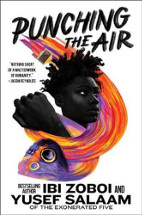Punching the air by Ibi Zoboi and Yusef Salaam

HarperCollins, 2020. ISBN: 9780008422141.
(Age: 14+) Highly recommended. Amal's name means hope, but it is
hard to feel hope when you are a black kid that has been hauled in
for street fighting, and there is white kid in a coma in hospital.
Amal knows that he has already been shaped into a monster in
people's minds, and it doesn't matter what he says. He is innocent,
but everything is stacked against him.
The story is fictional but draws on the lived experience of
co-author Yusef Salaam, one of the 'Exonerated Five', the group of
black boys falsely convicted of assaulting and raping a young white
woman jogging in Manhattan's Central Park in 1989. The five boys
were victims of racial profiling by the police determined to find
their culprit and were all given lengthy prison sentences. Only
years later were they exonerated when the real offender admitted to
his crime, corroborated by DNA evidence. With their book, Punching
the air, authors Ibi Zoboi and Yusef Salaam have collaborated
together to highlight ongoing issues of racial discrimination,
police violence and injustice still happening today.
The story is written in verse, similar to Manjeet Mann's Run,
rebel, with the same heart-felt rawness and honesty. We
feel Amal's fear, his retreat behind a stony-faced silence, his
confusion and desperation. His only relief is his art and his
poetry. The pages are illustrated with lines and smudges of black;
it is only when there a human connection with someone outside of the
prison, that his drawings become butterflies, because the flutter of
a butterfly's wings can have an impact around the world.
The story is bold and confronting with themes similar to the work of
Angie Thomas, The
hate U give, and On
the come up, but the book is easy to read; the verse
pages carry you along from the despair of the courtroom to the
harshness of prison and then finally the rediscovery of hope through
art, and the love of caring people.
Themes: Racism, Police brutality, Prison, Black Lives Matter, Social
justice.
Helen Eddy